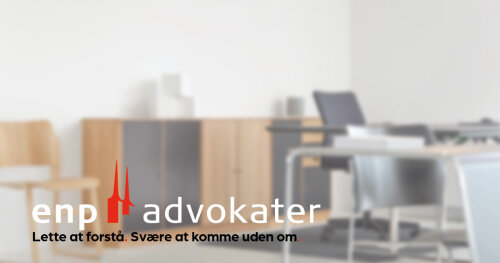Best Collaborative Law Lawyers in Roskilde
Share your needs with us, get contacted by law firms.
Free. Takes 2 min.
Free Guide to Hiring a Family Lawyer
List of the best lawyers in Roskilde, Denmark
About Collaborative Law in Roskilde, Denmark
Collaborative Law is a modern approach to resolving disputes that prioritizes negotiation, cooperation, and mutual respect over traditional court processes. In Roskilde, Denmark, Collaborative Law is most commonly used in family matters, especially divorce and child custody cases, but it can also apply to other civil disputes. The process involves both parties and their respective lawyers working together to reach a settlement that meets everyone's needs without resorting to litigation. This method encourages openness, privacy, and solutions tailored to individual circumstances, making it a preferred alternative for many facing legal challenges in Roskilde.
Why You May Need a Lawyer
People often seek a lawyer experienced in Collaborative Law for several reasons in Roskilde:
- Divorce or separation proceedings where both parties wish to avoid court
- Child custody and visitation arrangements requiring cooperative solutions
- Division of joint assets, property, and financial agreements
- Resolving inheritance disputes among family members
- Business partner disagreements seeking amicable settlements
- Drafting and negotiating family-based contracts
- Ensuring all legal paperwork aligns with Danish law
- Upholding each parties’ rights and interests through transparent negotiations
Lawyers in Roskilde specializing in Collaborative Law help clients communicate effectively, understand their legal positions, and finalize agreements that are legally sound and mutually agreeable.
Local Laws Overview
Collaborative Law operates within the Danish legal framework, particularly guided by the Danish Act on Parental Responsibility, the Marriage Act, and general civil law principles. In Roskilde, as in the rest of Denmark, the collaborative process is voluntary - both parties must agree to resolve their dispute outside of courtroom litigation. Lawyers representing each party must be trained in collaborative practices, ensuring they foster constructive negotiations. Confidentiality is a cornerstone, meaning discussions and documents exchanged during collaborative sessions cannot be used in subsequent court proceedings if the collaboration breaks down. While agreements reached are binding once signed, they often require final approval by relevant authorities like Family Court (Familieretshuset) if they deal with child custody or marital separation.
Frequently Asked Questions
What is Collaborative Law?
Collaborative Law is a legal process where both parties and their lawyers work together to resolve disputes amicably without going to court. Solutions are reached through negotiation rather than litigation.
How does Collaborative Law differ from mediation?
In Collaborative Law, each party has their own lawyer who is committed to settling the dispute without litigation. Mediation involves a neutral third party helping both sides reach an agreement, but the mediator does not offer legal advice.
Is Collaborative Law suitable for all disputes?
Collaborative Law is most effective where both parties are willing to cooperate and communicate openly. It may not be appropriate in cases involving abuse, significant power imbalances, or lack of transparency.
Are agreements made in Collaborative Law legally binding in Roskilde?
Yes, agreements reached are legally binding once both parties sign them. For family and child-related agreements, further approval from the authorities may be required.
Can I leave the Collaborative Law process at any time?
Yes, participation is voluntary, and you may end the process at any stage. If you choose to go to court afterward, you will usually need to retain a new lawyer due to confidentiality principles.
How long does the Collaborative Law process take?
The duration varies depending on the complexity of the issues and the willingness of both sides to cooperate. Many cases settle within a few meetings, often within a few weeks or months.
Is Collaborative Law more affordable than traditional litigation?
Collaborative Law can often be more cost-effective because it usually requires less time and fewer resources than courtroom litigation, but costs depend on individual circumstances.
Do both parties need a lawyer?
Yes, each party must be represented by a specially trained Collaborative Law lawyer to ensure fairness and legal protections throughout the process.
What happens if no agreement is reached?
If negotiations fail, the collaborative lawyers withdraw from the case, and the parties may choose to proceed to court with new legal representation.
Can we involve other professionals in the Collaborative Law process?
Yes, the process often includes other specialists such as financial advisors, psychologists, or child experts to assist in finding the best solutions for everyone involved.
Additional Resources
Here are some valuable resources for those seeking legal advice in Collaborative Law in Roskilde:
- Familieretshuset (The Danish Family Court) - Oversees family and child-related legal matters
- Retshjælpen (Legal Aid offices in Roskilde) - Offers legal advice and guidance
- Dansk Selskab for Collaborative Law - Professional association for collaborative lawyers in Denmark
- Advokatsamfundet (The Danish Bar and Law Society) - For finding certified collaborative law lawyers
- Local mediation centers - For alternative dispute resolution support
Next Steps
If you think Collaborative Law might be the right solution for your situation in Roskilde, consider these steps:
- Identify your needs and priorities for resolving your dispute
- Reach out to a local lawyer experienced in Collaborative Law
- Schedule an initial meeting to discuss the process and your options
- Prepare any relevant documents related to your case
- Ask questions about the process, costs, and expected timelines
- Engage in open communication with your counterpart if possible
Collaborative Law offers a constructive and respectful approach to resolving disputes. Seeking guidance from a qualified legal professional in Roskilde can help you better understand your options and find an agreeable solution tailored to your needs.
Lawzana helps you find the best lawyers and law firms in Roskilde through a curated and pre-screened list of qualified legal professionals. Our platform offers rankings and detailed profiles of attorneys and law firms, allowing you to compare based on practice areas, including Collaborative Law, experience, and client feedback.
Each profile includes a description of the firm's areas of practice, client reviews, team members and partners, year of establishment, spoken languages, office locations, contact information, social media presence, and any published articles or resources. Most firms on our platform speak English and are experienced in both local and international legal matters.
Get a quote from top-rated law firms in Roskilde, Denmark — quickly, securely, and without unnecessary hassle.
Disclaimer:
The information provided on this page is for general informational purposes only and does not constitute legal advice. While we strive to ensure the accuracy and relevance of the content, legal information may change over time, and interpretations of the law can vary. You should always consult with a qualified legal professional for advice specific to your situation.
We disclaim all liability for actions taken or not taken based on the content of this page. If you believe any information is incorrect or outdated, please contact us, and we will review and update it where appropriate.









